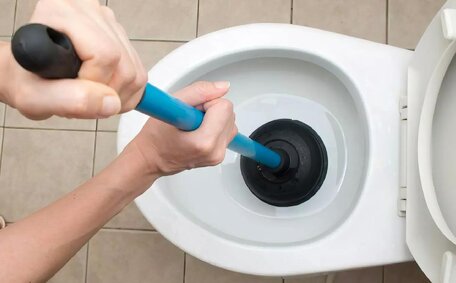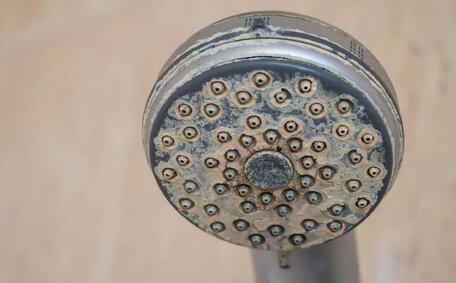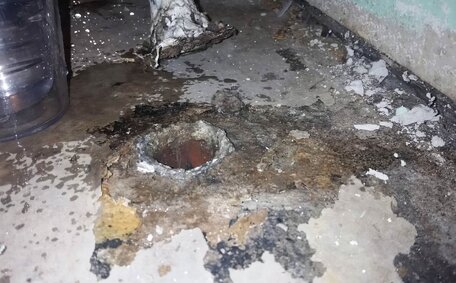Recognizing the signs of a gas leak
Grasping the consequences of gas leaks and knowing appropriate safety responses is vital for effectively dealing with them. Be aware of these common gas leak indicators in your home:
- A pronounced rotten egg scent - a strong indicator of a gas leak, this unmistakable odour demands immediate safety precautions. A persistent sulfuric odour is a clear sign of a gas leak.
- Hissing or whistling sounds from your gas appliances or pipes - These sounds suggest a leak and the need for investigation. These noises often point to a leak where gas is escaping abnormally.
- Dead vegetation in usually green areas - Noticing wilted plants or shrubs near your gas line should prompt immediate action to locate the source of the underground gas leak affecting your garden’s health.
- Bubbles in standing water - Observe standing water for bubbles, which could indicate a gas leak; proceed with caution if noticed. This can be a sign of an LP gas leak coming your way, particularly troubling for those with gas hot water systems, prompting action in line with Australian gas safety procedures.
- Soil erupting from the earth - Noticing ground soil upheaval or foam might signal gas coming from an underground source to your attention.
- Unusual odours near your gas stove or appliances - these smells may indicate a gas leak.
- Your furnace flames manifesting orange rather than blue - If your appliance’s pilot light is orange instead of blue, it signals a potential carbon monoxide hazard.
Staying alert to these signs and knowing how to act if a leak is suspected can prevent danger; have a professional gas fitter assess your home if needed. Trust your instincts; if something seems off with your gas system, promptly call a professional gas technician for assistance.
Taking immediate safety precautions
If you suspect a gas leak in your Emu Plains home, it is crucial to take swift action to protect yourself and your family:
- Evacuate immediately - Lead everyone away from the property to safety, especially if you smell gas, to prevent exposure to potentially dangerous levels.
- Avoid using any electrical switches - Ward off your usage of lights or appliances to prevent ignitions that leaking gas can cause.
- Avoid the use of telephones or mobile phones indoors - Their operation may generate sparks and pose new risks. Use phones only after you’re securely situated outside your property’s boundaries.
- Avoid striking any matches or lighters - Any flame or spark may ignite gas, an especially risky situation should your dwelling be exposed to gas vapours.
- Do not start vehicles - Starting a car or motorcycle can also create a spark, so avoid using vehicles until the leak is addressed.
- Turn off all your gas supply at the main valve -
- Open doors and windows to ventilate and clear any indoor gas accumulation after discovering a leak.
- Call 000 for emergency services - It’s paramount to inform emergency services, followed by contacting your gas distributor to manage the situation. Make the call only once you’ve ascertained a safe perimeter, potentially away from the causes gas leak situations, and don’t hesitate to give us a call for swift professional assessment.
- Contact your local gas company for technicians to inspect and repair leaks swiftly; call us for assistance and gas appliance safety.
- Do not re-enter the dwelling until declared safe - Await confirmation from emergency services that there are no risks from compromised gas pipes before returning inside.
Immediate action upon suspecting a gas leak significantly reduces potential hazards. Do not delay in evacuating and alerting emergency services to ensure the leak is handled properly.
Evacuating the area
If a serious gas leak is suspected in your home, evacuation should be immediate. Do not delay leaving the house or attempt to collect personal belongings. The most important step is to get yourself and others out of the home and away from the gas leak safely and quickly.
When evacuating due to a potential gas leak:
- Evacuate at once if you detect gas. Do not shut off appliances, collect belongings, or turn off lights.
- Alert anyone else in the home to leave immediately with you.
- Assist those needing help to evacuate, especially when gas leak signs are apparent.
- Avoid using any phones, electrical switches or electronics that could produce sparks.
- Move upwind to evade inhaling gas and call emergency services from a secure location.
- From a safe distance, call 000 to report the leak and request emergency services.
- Similarly, call your local gas company once you’re at a safe location.
- Do not re-enter the home until emergency responders indicate it is safe to do so.
Ventilating the house
If you suspect a gas leak, ventilate the house to help disperse the gas while waiting for emergency services. However, use ventilation only as a temporary measure and not as a substitute for evacuating the area if you smell gas inside your home.
When airing out your space after identifying a possible smell of gas in your home:
- By opening doors and windows to increase air flow, it becomes easier to detect escaping gas, especially crucial if you’re wary of a leak adjacent to any gas-powered devices in your home.
- Use extraction fans, like those in kitchens and bathrooms, to deter gas build-up and keep the environment safe, important if you use natural gas.
- Do not turn on any electrical devices or lights, as sparks could ignite escaped gas.
- Do not light any matches, lighters, or flames of any kind.
- Get out of the home as soon as possible while ventilating.
- Once safely outside, call 000 to report the leak and request emergency services to assess your home.
- Additionally, urgently inform your gas company if you suspect gas exposure in your surroundings.
- Re-enter the home only when emergency crews have confirmed it’s safe.
If there’s a substantial gas leak or other alarming signs, evacuate without delay and seek emergency aid right away. Safety is imperative.
Calling for emergency assistance
Immediately call 000 to prompt emergency services to your location. Professional handling of the situation mitigates risks and secures the safety of your home.
If you suspect a gas leak, evacuate and immediately call 000 for emergency assistance.
- Call 000 as soon as possible from a safe location, emphasising the urgency if you suspect gas in your home.
- Clearly state your suspicions of a gas leak at your address to emergency responders.
- Report on any potent gas smell, akin to rotten eggs, or other troubling indicators you’ve noticed.
- Provide any details emergency operators request.
- Emphasise the need for urgent response due to gas leak risks.
- Also contact your gas company after calling 000 so they can despatch technicians.
- Do not re-enter your home until emergency crews give the all-clear that it is safe.
Getting professional emergency assistance for a potential gas leak should always be an immediate priority after evacuation. Do not delay in calling for urgent help to address the hazard - Emu Plains Plumbing and emergency services are ready to respond 24/7.
When contacting eme/li>
Provide any details emergency operators request.Shutting off the gas supply
If you smell a serious gas leak and it’s safely accessible, shut off the main gas valve to reduce risk. Avoid this if access to the valve requires entering a concentrated gas area.
To locate the source where the gas leak may be:
- Locate the main gas shutoff device, often situated near your gas meter on the pipeline, and pinpoint the source of the leak to halt possible gas emission in your home.
- The valve will likely be labelled, indicating there’s a handle to control the flow, confirming there may be a gas leak in your home, which you can turn.
- Use an adjustable wrench or suitable valve tool to ensure the valve is twisted sufficiently to shut off gas. Turning clockwise will effectively turn off gas to your house.
- If you don’t have the proper tool, a pair of pliers may also work to grip and turn the valve.
- Fully rotate the valve handle until it’s at a right angle with the pipe, indicating the gas supply to your home is shut off.
- Clearly mark the shut-off valve with something visible like a tag or bag that says gas off so nobody reopens it.
Keep in mind that you should only attempt to shut off the main gas valve if it is safely accessible without exposure to leaked gas.
Your first priority should be to evacuate and ensure no harm from gas lines inside your home. Contact emergency services promptly and seek help from a licensed gas fitter to address the gas supply issue securely.
If you smell a serious gas leak and it is safe to do so, shutting off the main gas supply valve to your Emu Plains home can help reduce the risk until emergency services arrive.
Educating family members
It’s vital to educate all family members, including children, about gas safety and how to respond if they ever smell gas in your house. Here are some tips:
- Clarify the gas leak symptoms - the distinct rotten egg scent added to aid in identifying leaks.
- Show ti>Educate them that if they detect a smell coming from gas, they must never attempt to ignite matches or manipulate any electrical devices.
- Ensure they understand the importance of evacuating the home and not remai gather once outside.
- Let them know to never re-enter the home until emergency responders say it is safe.
Imparting safety tips about gas handling to your children and family could enable them to react aptly should they detect early signs of a leak. Empower them to act quickly to warn others and get outside, potentially preventing a dangerous situation.






